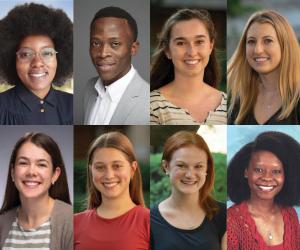This profile was current as of May 2022, when she was part of the on-campus Kellogg community.
Abigail Sticha is working with Professor Ernesto Verdeja on his project titled, “Triggers of Mass Killings (ToMK)” which focuses on the dynamics of violence escalation, sustainment, and declines. As a research assistant, Sticha is working with Dr. Paul Brenner in the Center for Research Computing to leverage machine learning and natural language processing tools to automate the text classification process for the Triggers of Mass Killings project. This will allow the team to more quickly find trends in the nine triggers that often precede state led mass killings. These trends will inform policy makers on what factors may lead to the next event of mass violence within a country. Sticha has been a co-author of published papers related to this project titled NLP Workflows for Computational Social Science: Understanding Triggers of State-Led Mass Killings and Visualization Techniques to Enhance Automated Event Extraction. Sticha is now working on a lead-authored paper comparing the NLP tools used on the project.
In the summer of 2020, Sticha participated in an NSF Research Experience for Undergraduates at the Notre Dame Center for Research Computing. Under the mentorship of Professor Paul Brenner, Sticha’s primary focus was to research the advantages and disadvantages of utilizing support vector machines for natural language processing and event classification within the social sciences. Sticha also created a replicable machine coding framework that future social scientists will be able to utilize to perform text classification with relatively small data sets. In order to create this framework, Sticha used the Triggers of Mass Killings project as a case study for training the support vector machine algorithm.
I am interested in implementing machine learning tools, such as support vector machines and neural networks, to create social good that expands past the boarders of the United States. I am also committed to making sure these implementations are integrated with a focus on AI and data ethics to protect both user data and mitigate bias in the models.
I have been working on lead authoring under the mentorship of Dr. Verdeja and Dr. Brenner. Through this paper, I have been able to address the progress that our team has made in regards to our work in identifying patterns in triggering events that proceed state led mass killings. The paper has encouraged me to unite the different work that I have done both on the political science side of the project, reading and identifying trigger related news articles, and the computer science side of the project where I have now trained three different machine learning models that can read articles from a database and identify them as a triggering event or not. My current work and version of the paper is focusing on comparing these three separate models to gain a better sense of the text data and classified articles that we are working with so that the political science team can get a better understanding of the ordering and timing of these political events.
-
2022 Google DeepMind Cambridge Scholarship: funds postgraduate studies in computer science related fields
Sticha will pursue a Master's in machine learning and machine intelligence from Cambridge University








